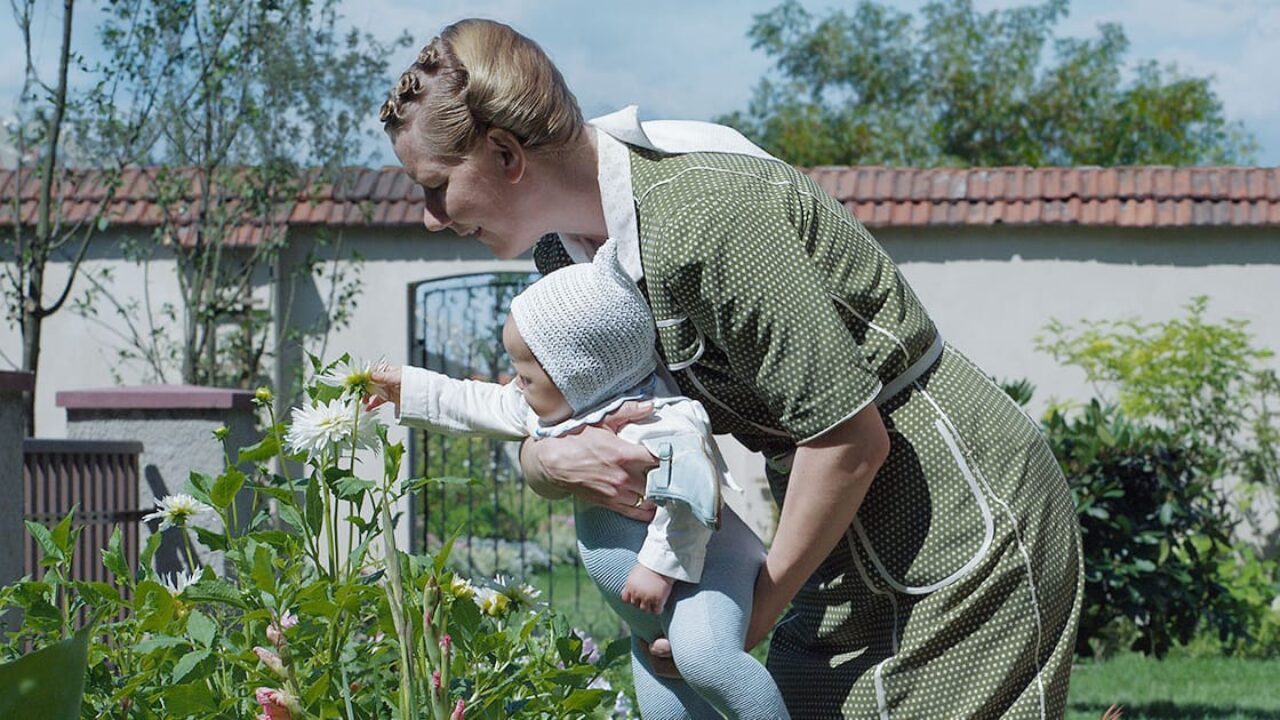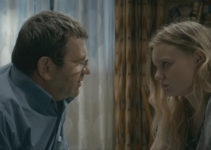
‘The Zone of Interest’ is like no other Holocaust film you will experience. Writer-director Jonathan Glazer has created a way to show us the horrors indirectly. He accomplishes this through a compelling cinematic style. The film centers on a German couple who raise their family outside the walls of Auschwitz prison camp. Glazer goes to meticulous detail to re-create the house, gardens, and swimming pool of this ordinary family. It just so happens to depict the real-life commandant of the camp, Rudolph Hoss (Christian Friedel) and his wife, Hedwig (Sandra Huller). This is a timely film that is not just about the Nazis but about the “banality of evil” that goes on around the world. ‘The Zone of Interest’ needs to be seen in a movie theater.
The film opens with a family enjoying a picnic along a river. It’s an idyllic afternoon as they pick berries and sunbathe. They return home and we continue to watch them as voyeurs. They appear to be a regular German family that eats dinners, reads bedtime stories, and plans holidays. It takes time to realize their beautiful home is located outside the walls of Auschwitz prison camp. We never see the atrocities inside the camp but we hear the sounds. We hear gunshots, dogs bark, cries and yelling. There is the constant arrival of trains and the bellowing of chimneys. Accompanied by these horrible noises is a haunting musical score by Mica Levi.
During their daily lives, the kids go off to school and Hedwig, known as “the Queen of Auschwitz” makes sure her gardens are pristine. There is a haunting scene where a worker spreads ashes in the garden as fertilizer. There is another scene where she tries on a fur coat and puts on lipstick. We slowly begin to realize it was taken from a Jewish woman brought to the camp. In any other context it would be considered a mundane task but not here. The reality is that these possessions come from the concentration camp. This is how the film gets to you. It is appalling that Hedwig would even allow her gardeners to use ashes as fertilizer. It goes back to the “banality of evil” phenomenon. It explains how ordinary people can live in denial while genocide is taking place.
Hedwig becomes upset when she finds out Rudolph is being transferred to another assignment. She is beside herself for having to leave the paradise that she has created for her family. She’s never distraught over the atrocities at the camp. She convinces Rudolph to talk to his supervisor and let her and the kids stay at the house. This turns into a promotion for Rudolph that will eventually allow him to return to his family. Even though the family lives their lives like nothing is happening over the wall, there are subtle hints that it affects them indirectly. Rudoph takes the kids for a swim when he notices human remains in the stream. One of the boys plays with human teeth. One of the girls has bouts of sleepwalking. Their youngest baby constantly cries. Their family dog always seems to be in a constant state of anxiety. Hedwig’s mother visits and coughs from the black soot coming from the crematorium smokestacks. You get the sense the kids are not completely oblivious to what goes on at the camp.
‘The Zone of Interest’ delivers an important message about the banality of evil. It is not just about the atrocities of the Holocaust. Glazer is making a bold statement about how wars and human suffering go on while we lead our ordinary lives. As we walk through the normalcy of everyday life, human suffering happens around the world from war. The reason this film is so powerful is that the audience never loses sight of the horrors going on off-screen. The audio is unable to camouflage the horrors of Auschwitz. Hewig’s flowers cannot hide the horrible sounds of genocide. ‘The Zone of Interest’ has garnered five Academy Award nominations. Hands down, it deserves the best sound accolade.


